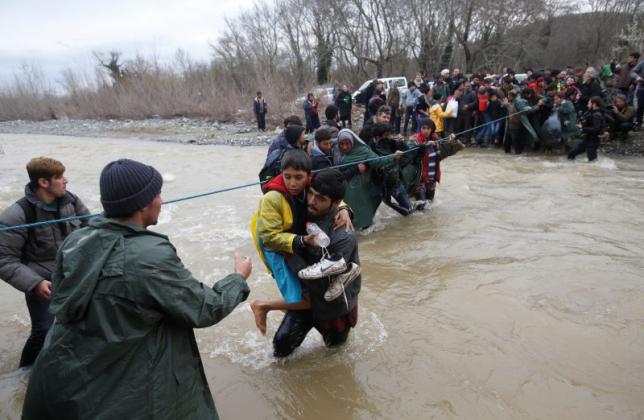
Migrants wade across a river near the Greek-Macedonian border, west of the the village of Idomeni, Greece, March 14, 2016. REUTERS/Stoyan Nenov
Hundreds of migrants flounced out of an overcrowded Greek transit camp, tramped for hours along muddy paths and waded thigh-deep through a rain-swollen river to get around a border fence and cross into Macedonia, where they were detained on Monday, authorities said.
A Macedonian police official said Tuesday about 1,500 migrants who managed to cross into Macedonia, despite the border being closed to them for a week, have been sent back to Greece by Macedonian troops.
Also witnesses said that a group of around 80 journalists and activists were detained by Macedonian police after travelling with the group were. They were later released and allowed to return to Greece.
“Yesterday we had a large group of illegal migrants who tried and managed to cross the border unlawfully near the village of Moin,” AFP cited Toni Janevski, a Macedonian army spokesman.
“Without any incident or use of force, they were blocked and in the early morning hours they were returned to Greece.”
However, back on the Greek side, some reporters said they had seen at least two men who appeared to have been beaten.
Earlier, Macedonian police said three migrants – two men and a woman – had drowned crossing a river near the Greek border that had been swollen by heavy rain.
The crossing brings the migrant issue back into the spotlight days before leaders from the European Union and Turkey are due to meet again to seal an agreement intended to keep migrants in Turkey from moving to Europe through Greece.
Greek officials said leaflets in Arabic had been circulated at the migrants’ camp at Idomeni describing the route across the river and warning they risked being sent back to Turkey if they stayed in Greece, the ANA news agency reported.
“We are in possession of leaflets that show this was an organised incident, a very dangerous one, endangering people’s lives,” Greek government spokesman George Kyritsis told reporters as the Greek cabinet met late into the night to discuss the migrant crisis.
The meeting, which took place inside Maximos mansion, ended without any conclusions being announced about Greece’s reaction to Monday’s events.
At least 12,000 people, including thousands of children, have been stranded in a sprawling tent city in northern Greece, their path to the EU blocked after Macedonia and other nations along the so-called Western Balkan route closed their borders.
Hungarian Foreign Minister Peter Szijjarto said Hungary was the EU country that had sent most police officers to help non-EU member Macedonia protect its border with Greece.
“Macedonia needs and deserves help and assistance from the European Union because actually they’ve been protecting the southern border of the European Union,” he told reporters in Brussels.
Babar Baloch, regional spokesman for U.N. refugee agency UNHCR, said conditions in the Idomeni camp were difficult after days of heavy rain.
“This is not a proper camp. People are exhausted, tired and running out of patience,” he said.
A Serbian customs spokeswoman said 33 migrants trying to cross into Serbia from Macedonia had been found in an empty cargo train in Presevo, southern Serbia, on Saturday and had been handed over to police.
The group, aged between 18 and 26, was mainly Afghans, but also included Syrians and Libyans. All but one were men.
In Berlin, German Chancellor Angela Merkel said on Monday there was no doubt Germany has benefited from the closure of the Balkan migrant route. A day earlier, voters in three regional elections had punished her conservatives and flocked to a new anti-immigration party that wants German borders closed.
But Italian Prime Minister Matteo Renzi said it was time to say enough to the selfishness of countries that thought raising a wall was a lasting response to the migrant challenge. “How long do you think a wall might last in the Internet age?” Renzi told students in Rome.
